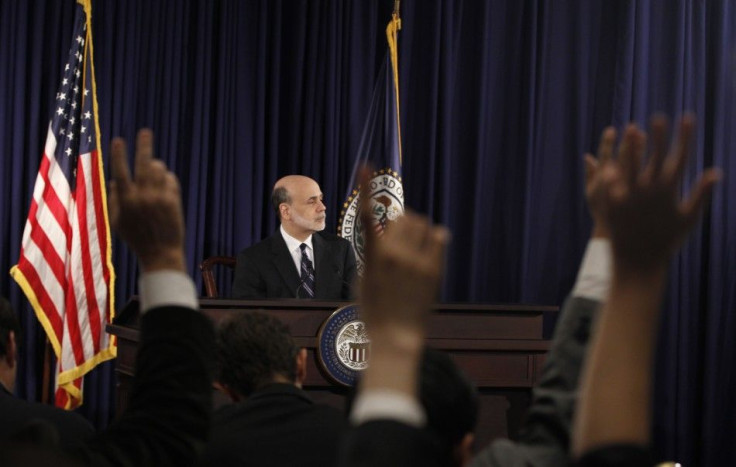Markets Fluctuate As Press Corps Shells Bernanke

Federal Reserve Chairman Ben Bernanke faced an unusually hostile press corps Wednesday after the U.S. central bank's key rate-setting committee concluded a two-day meeting, during which members decided to leave the nation's monetary policy more or less where they found it.
The Federal Open Market Committee released a statement saying it plans to maintain interest rates at their currently ultra-low levels through much of 2014 but slightly increased its outlook for the U.S. economy's growth and inflation.
After delivering a boilerplate speech affirming the FOMC statement, Bernanke opened the floor to questions from the financial media. The barrage that ensued was quick an furious.
First, the Chairman was taken to task on the Federal Reserve's views of where inflation was headed, in questions that had the pointed feel of accusing the central bank of burying its collective head in the sand as headline inflation slightly exceeded the bank's 2 percent target earlier this year.
Some of the movements in the first quarter seemed to have come from transitory factors, Bernanke would concede to a question from one reporter, noting that increases due to volatility in energy prices were seen by the central bank board as a temporary bulge and projections on inflation were made assuming no new shocks in the oil sector.
From then the questioning became more contentious, with several reporters asking Bernanke to justify discrepancies between the summary minutes of the FOMC's last meeting and a just-released addendum noting economic and policy expectations of individual committee members.
How was it possible for the summary minutes to say the Fed was happy keeping interest rates at exceptionally low levels until late 2014 when the addendum document showed only four of the 17 committee members believed rates should be kept at current levels until then?
There's certainly a range of views, Bernanke said, but the committee had no difficulty coming to a consensus that the guidance was appropriate.
Then the gloves really came off. In various questions, reporters subtly questioned if Bernanke's current policy direction was hypocritical given the views he had expressed decades earlier as an academic economist. Another question floated a criticism of U.S. central banking that has become in vogue as of late: the idea that low and steady inflation is an unwise goal to pursue in the face of very high unemployment, even if that is the Fed's dual mandate.
Answering the first set of questions, Bernanke firmly stated: There's this view circulating that the views I expressed 15 years ago on the Bank of Japan are inconsistent with our policies. That is incorrect. He mainly justified the answer on the fact that the Japan he studied as an academic was undergoing deflation, which the U.S. is not experiencing.
A somewhat irked Bernanke then forcefully shot back at the implied accusations that the Fed was not doing enough to boost employment, going through a list of the actions the central bank had done in recent years, and saying risking high inflation for what he termed tentative, and perhaps doubtful gains in the labor force was an unwise path.
Does it make sense to actively seek a higher inflation rate to perhaps see a small reduction in the pace of unemployment? Bernanke asked. The view of the committee is that that would be reckless.
While the round of questions softened somewhat near the end of the 45-minute press conference, they appeared to have shaken the Fed chairman somewhat, as his language became less precise, going from saying the board was confident in its direction to at one point stating we see monetary policy as being approximately on the right place and mentioning that, when performing the rate-setting function of a central bank, it's always better to be humble than to avoid being too confident.
The chairman even seemed to defer somewhat to the media in the room. Facing a question from a Bloomberg reporter as to whether the Fed's recent communications strategy had been successful, he shot back Well, I think that's part of your job to say.
U.S. equities rose nearly half a percentage point at the beginning of his press conference, but after a volatile hour of trading, the benchmark S&P 500 Index of U.S. equities settled near the level it had found itself before. It closed at 1,390.71, up 1.37 percent for the day.
© Copyright IBTimes 2024. All rights reserved.











